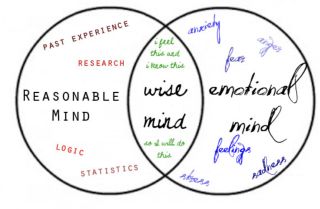Therapy
The Dialectical Behavior Therapy Skills I Still Use Today
Personal Perspective: I first learned DBT in 1990. I still use it regularly.
Posted January 24, 2023 Reviewed by Gary Drevitch

When I was diagnosed with borderline personality disorder (BPD) in 1990, I was a patient on an acute unit in a New York City hospital following my second suicide attempt. The plan was to transfer me to a psychiatric hospital in a suburb of the city that had a long-term unit designed specifically for patients with BPD. This unit was radical in that the treatment modality it used was a relatively new therapy called dialectical behavior therapy, or DBT.
I was on that long-term unit for 10 months. We lived, ate, and breathed DBT, attending daily skills groups and individual coaching sessions, and filling out daily diary cards. And there was informal coaching from the entire staff, if we were having a bad day, feeling angry, or having urges to self-harm or if we felt suicidal.
We cycled through the four DBT modules — mindfulness, interpersonal effectiveness, emotional regulation, and distress tolerance — several times while I was there. I gained an excellent grasp of the skills. When I was discharged, it was because my insurance balked at paying for additional time, not because my treatment team thought I was ready. They believed I was still a danger to myself and their initial plan was to transfer me to a state hospital in Queens, NY.
That’s when my mother stepped in and declared, “No child of mine is going to a state hospital.” A compromise was reached and the insurance agreed to pay for me to reside in a 24/7 supervised residence and attend a BPD DBT day program the hospital ran. Many of the staff from the inpatient unit stepped over to run the day program, which was a new venture. I stayed at the day program for 18 months and at the halfway house for three years.
So it's fair to say, I’ve had a lot of DBT. After leaving the day program, I was still chronically suicidal, self-harming, and depressed. I was seeing my therapist from the day program in her private practice. I knew the skills intellectually but couldn’t make the leap into applying them when I needed them most. After over a decade with this therapist, I quit and stopped all my medication and, unsurprisingly, fell into a deep suicidal depression.
Referred to psychiatrist Dr. Lev (not her real name) for a medication consultation, we ended up working together for eleven years. Dr. Lev practiced transference-focused psychotherapy (TFP), in which the emphasis is placed on the relationship between the therapist and the client. The work can get intense at times as TFP is a psychodynamically-oriented treatment and we opened numerous painful wounds.
Dr. Lev told me more than once that the DBT skills I learned served as a foundation I needed to get through these intense periods without resorting to self-harming and other self-destructive behaviors. Apparently, something finally clicked.
I still use the DBT skills today. Some of the ones I use most often include:
Radical Acceptance. According to Marsha Linehan, who developed DBT, “Radical acceptance rests on letting go of the illusion of control and a willingness to notice and accept things as they are right now, without judging.” It is a “complete and total openness to the facts of reality as they are, without throwing a tantrum and growing angry.”
Radical acceptance is a distress tolerance skill and a difficult one. It’s a process. I remind myself that radical acceptance doesn’t mean forgetting or forgiving, but rather accepting a painful situation. It helped me get through the rough year following my father’s death, which triggered a deep depression and subsequent suicide attempt.

Wise Mind. DBT uses the concept of a logical, emotional, and wise mind to describe a person’s thoughts. The logical mind is driven by reason, the emotional mind is driven by feelings, and the wise mind is a balance between the two. The goal is to learn to use the state of wise mind to improve behavior.
When I find myself feeling off the rails, I remind myself to get balanced and try to get into wise mind. I remind myself that wise mind is a combination of logical mind and emotional mind and it’s not ideal to be too much in either extreme.
Mindfulness. According to Psychology Today, “mindfulness encompasses two key ingredients: awareness and acceptance. Awareness is the knowledge and ability to focus attention on one’s inner processes and experiences, such as the experience of the present moment. Acceptance is the ability to observe and accept—rather than judge or avoid—those streams of thought.” I try to practice mindfulness as often as I can. I find it grounds me for a busy day ahead. I admit I’m not perfect; I don’t manage to get it in every day, but I find that when I do, it does help.
Self-Soothing with the Five Sense. This is one of the distress tolerance skills. Pick one or two favorite items that correspond with one of the five senses and put it in your “toolbox” so you have it ready. Some of my favorites are a scented candle for smell, a weighted blanket for touch, a special playlist for hearing, a photo of a spectacular sunrise or sunset for vision, and single-serve gourmet chocolate for taste.
This is a sampling of the DBT skills I use most often. They each serve a different purpose in my life, helping me get through the day-to-day and the really heavy events. Today, DBT has been expanded for use with numerous populations, including those living with substance use disorders, eating disorders, and depression.
Still, it’s important to realize that there are other options for therapy in addition to DBT. These include general psychiatric management, transference-focused psychotherapy (TFP), mentalization-based therapy (MBT), schema-focused therapy, and systems training for emotional predictability and problem-solving (STEPPS). If you are interested in any of these therapies, talk with a therapist to determine the best option.
Thanks for reading.
Andrea




